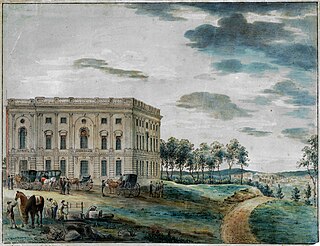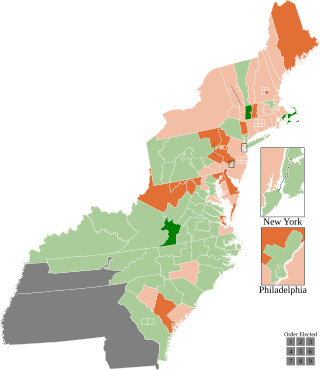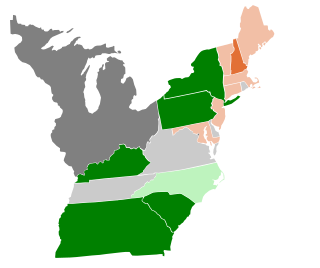Related Research Articles

The 6th United States Congress was the 6th meeting of the legislative branch of the United States federal government, consisting of the Senate and the House of Representatives. It initially met at Congress Hall in Philadelphia, Pennsylvania and then was the first congress to meet in the new Capitol Building in Washington, D.C.. Its term was from March 4, 1799, to March 4, 1801, during the last two years of John Adams's presidency. It was the last Congress of the 18th century and the first to convene in the 19th. The apportionment of seats in House of Representatives was based on the 1790 United States census. Both chambers had a Federalist majority. This was the last Congress in which the Federalist Party controlled the presidency or either chamber of Congress.

The 1828–29 United States House of Representatives elections were held on various dates in various states between July 9, 1828, and October 5, 1829. Each state set its own date for its elections to the House of Representatives before the first session of the 21st United States Congress convened on December 7, 1829. Elections were held for all 213 seats, representing 24 states.

The 1822–23 United States House of Representatives elections were held on various dates in various states between July 1, 1822, and August 14, 1823. Each state set its own date for its elections to the House of Representatives before the first session of the 18th United States Congress convened on December 1, 1823. They occurred during President James Monroe's second term.

The 1802–03 United States House of Representatives elections were held on various dates in various states between April 26, 1802 and December 14, 1803. Each state set its own date for its elections to the House of Representatives, either before or after the first session of the 8th United States Congress convened on October 17, 1803. They occurred during President Thomas Jefferson's first term in office.

The 1798–99 United States House of Representatives elections were held on various dates in various states between April 24, 1798 in New York and August 1, 1799 in Tennessee. Each state set its own date for its elections to the House of Representatives, with some after the official start of the 6th United States Congress on March 4, 1799, but before the start of the first session of this Congress in Philadelphia on December 2, 1799. These elections were held during President John Adams term. It was the last congressional session before the move to the new capital at Washington, D.C. Elections were held for all 106 seats, representing 16 states.

The 1796–97 United States House of Representatives elections took place in the various states took place between August 12, 1796, and October 15, 1797. Each state set its own date for its elections to the House of Representatives. The size of the House increased to 106 seats after Tennessee became the 16th state to join the union. The first session of the 5th United States Congress was convened on May 15, 1797, at the proclamation of the new President of the United States, John Adams. Since Kentucky and Tennessee had not yet voted, they were unrepresented until the second session began on November 13, 1797.

The first 1800 United States Senate special election in New York was held on April 3, 1800, by the New York State Legislature to elect a U.S. Senator to represent the State of New York in the United States Senate.

The 1800–01 United States Senate elections were held on various dates in various states, coinciding with Thomas Jefferson being elected to the White House. As these U.S. Senate elections were prior to the ratification of the Seventeenth Amendment in 1913, senators were chosen by state legislatures. Senators were elected over a wide range of time throughout 1800 and 1801, and a seat may have been filled months late or remained vacant due to legislative deadlock. In these elections, terms were up for the senators in Class 3.

The 1798–99 United States Senate elections were held on various dates in various states. As these U.S. Senate elections were prior to the ratification of the Seventeenth Amendment in 1913, senators were chosen by state legislatures. Senators were elected over a wide range of time throughout 1798 and 1799, and a seat may have been filled months late or remained vacant due to legislative deadlock. In these elections, terms were up for the senators in Class 2.

The 1796–97 United States Senate elections were held on various dates in various states. As these U.S. Senate elections were prior to the ratification of the Seventeenth Amendment in 1913, senators were chosen by state legislatures. Senators were elected over a wide range of time throughout 1796 and 1797, and a seat may have been filled months late or remained vacant due to legislative deadlock. In these elections, terms were up for the senators in Class 1.

The 1866–67 United States Senate elections were held on various dates in various states. As these U.S. Senate elections were prior to the ratification of the Seventeenth Amendment in 1913, senators were chosen by state legislatures. Senators were elected over a wide range of time throughout 1866 and 1867, and a seat may have been filled months late or remained vacant due to legislative deadlock. In these elections, terms were up for the senators in Class 3.

The 1798 United States House of Representatives elections in New York were held from April 24 to 26, 1798, to elect ten U.S. Representatives to represent the State of New York in the United States House of Representatives of the 6th United States Congress.

The 1800 United States House of Representatives elections in New York were held from April 29 to May 1, 1800, to elect ten U.S. Representatives to represent the State of New York in the United States House of Representatives of the 7th United States Congress.

Elections to the United States House of Representatives were held in Pennsylvania on October 9, 1798, for the 6th Congress.

A special election was held in Pennsylvania's 4th congressional district was held on October 9, 1798 to fill a vacancy left by the resignation of Samuel Sitgreaves (F), who'd been appointed commissioner to Great Britain under the Jay Treaty. The election was held on the same day as elections to the 6th Congress.

A special election was held in Pennsylvania's 1st congressional district on October 9, 1798 to fill a vacancy caused by the death of John Swanwick (DR) on August 1, 1798. The election was held on the same day as elections to the 6th Congress.

A special election was held in Pennsylvania's 8th congressional district on January 15, 1801 to fill a vacancy left by the death of Thomas Hartley (F) on December 21, 1800
A special election was held in New Hampshire's at-large congressional district on March 8, 1825 to fill a vacancy caused by Representative-elect James Miller declining to serve. The special election was held at the same time as the run-off election held to fill the 6th seat in New Hampshire's delegation.